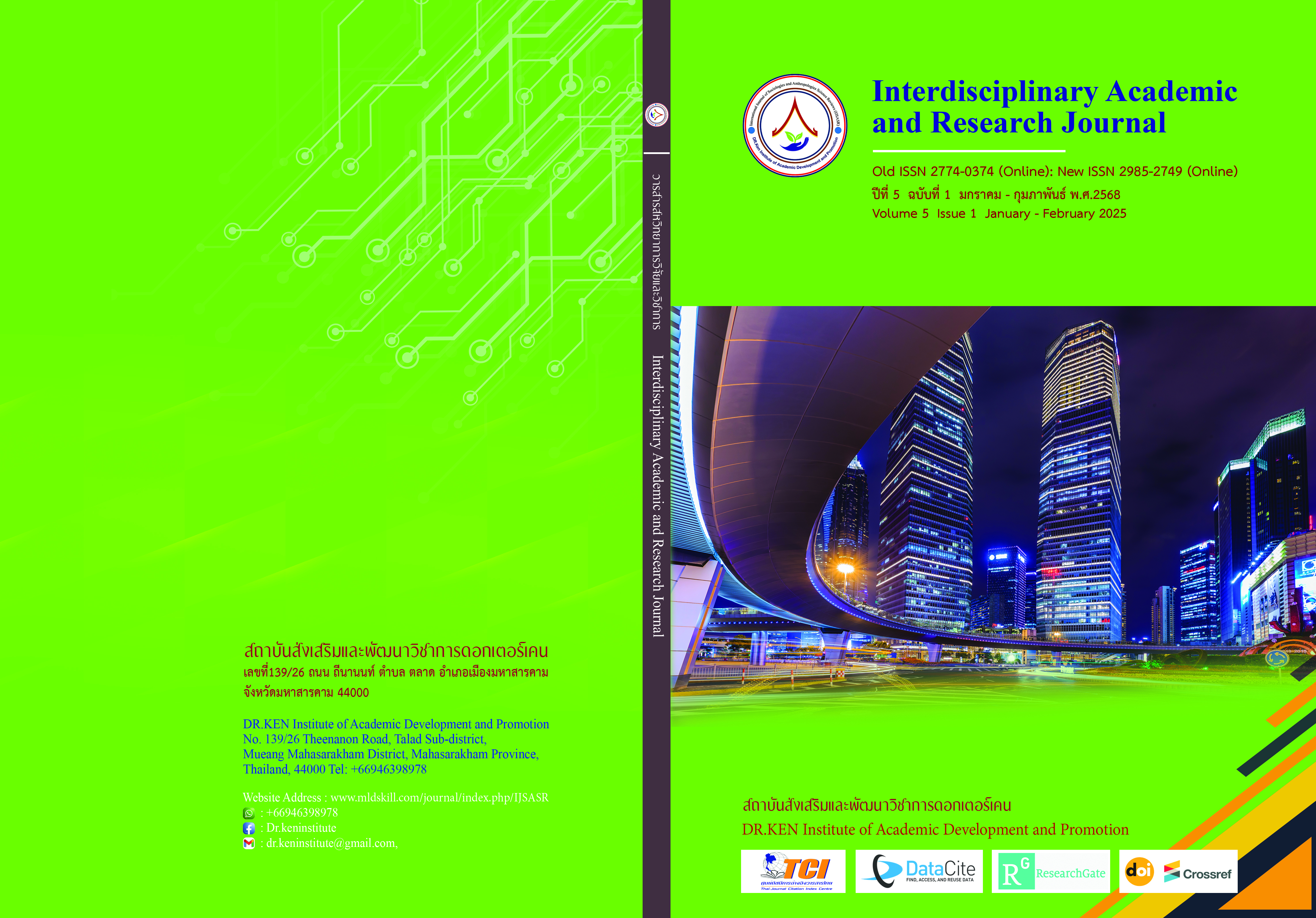Customs Law Enforcement in Environment Management for a Sustainable Future
DOI:
https://doi.org/10.60027/iarj.2025.280982Keywords:
Customs law enforcement, Environmental management, Sustainable futureAbstract
Background and Aims: Customs law enforcement is critical in environmental management because it helps prevent the illegal trade of endangered species, hazardous waste, and other environmentally harmful goods. Customs authorities protect biodiversity and enforce international environmental agreements by regulating and controlling cross-border movements. Thus, this academic article aims to 1) study and analyze the enforcement of customs law in environmental management for a sustainable future, and 2) to determine guidelines and solutions for improving the enforcement of customs law in environmental management for a sustainable future.
Methodology: This study is a study of documents and related research, analyzed and presented according to the educational objectives.
Results: The results of the study found that 1) the enforcement of laws on the inspection of imported and exported goods is ineffective, resulting in smuggling of goods that have an impact on the environment and a lack of environmental management for a sustainable future. This is partly due to the lack of personnel with knowledge and expertise in using technology, which is an important factor in inspection, as well as the lack of coordination between relevant government and private agencies in the responsible agencies, and the problem of law enforcement due to the insufficient number of customs officers for the increasing workload, resulting in delayed and incomplete inspection of goods. The shortage of personnel also causes existing officers to take on excessive workloads, including a lack of cooperation between government and private agencies in environmental management and customs law enforcement. 2) If there is cooperation in all sectors, it will enhance work efficiency, reduce the risk of corruption, and build public and business confidence. In addition, cooperation will help to make inspection and control of imported and exported goods more comprehensive. In order to manage the environment for a sustainable future, it is proposed to amend the law on training personnel to have expertise, including coordination between the government and private sectors to create cooperation in environmental management for a sustainable future.
Conclusion: To amend the Customs Act of 2017 by specifying training and skills development regulations for customs officials and requiring cooperation between government agencies and the private sector in all relevant sectors.
References
กรมส่งเสริมคุณภาพสิ่งแวดล้อม. (2565). การจัดการสิ่งแวดล้อมเมืองที่ยั่งยืน: ประสบการณ์ แนวทาง และบทเรียน การพัฒนาเมืองสู่รางวัลอาเซียนด้านสิ่งแวดล้อมเมืองที่ยั่งยืน รางวัลเทศบาลน่าอยู่อย่างยั่งยืน และรางวัลเทศบาลด้านสิ่งแวดล้อมยั่งยืน. กองส่งเสริมการมีส่วนร่วมของประชาชน กรมส่งเสริมคุณภาพสิ่งแวดล้อม.
ชุลีกร เทพบุรี, ธัญญ์ธิชา ศรีคา, นภัสสร แซ่ลิ้ม, ศุภชัย เหมือนโพธิ์ และวทัญญู รัศมิทัต. (2562). ปัจจัยที่ส่งผลต่อการตัดสินใจเลือกใช้บรรจุภัณฑ์เพื่อสิ่งแวดล้อมของผู้ประกอบการรายย่อย. วารสารมนุษยศาสตร์และสังคมศาสตร์ มหาวิทยาลัยเอเชียอาคเนย์. วารสารมนุษยศาสตร์และสังคมศาสตร์, 3(1), 50-58.
นันทวัน หสตังไทรแก้ว. (2567). อาเซียนกับการบริหารจัดการด้านสิ่งแวดล้อม. Retrieved from: https://www.parliament.go.th/ewtadmin/ewt/parliament_parcy/ewt_dl_link.php?nid=77017&filename=article_translate
สริญญา ศาลางาม. (2565). ตัวแบบการพยากรณ์ปริมาณก๊าซคาร์บอนไดออกไซด์ด้วยวิธีการวิเคราะห์การถดถอยและวิธีโครงข่ายประสาทเทียม. วารสารวิชาการเทคโนโลยีอุตสาหกรรม : มหาวิทยาลัยราชภัฏสวนสุนันทา, 10 (2), 54-65.
อรรฏชณม์ สัจจะพัฒนกุล. (2561). ประวัติศาสตร์สิ่งแวดล้อมเพื่อการพัฒนาที่ยั่งยืน: การเรียนรู้สู่การสร้างพลเมืองที่มุ่งเน้นความเป็นธรรมทางสังคมและสิ่งแวดล้อมในบริบทไทย. วารสารภาษา ศาสนา และวัฒนธรรม. 7(2), 273-304.
ASEAN Environment. (2022). ASEAN, EU kick-off region-wide cycling event to promote a sustainable environment. Retrieved from: https://environment.asean.org/environment-sustainable-cities/about
Customs Act 1960. (2024). Appointment Of Officers. Retrieved from: https://sso.agc.gov.sg/Act/CA1960?ProvIds=P12-#pr5-
Environmental Protection and Management Act 1999. (2024). Part 2 Administration. Retrieved from: https://sso.agc.gov.sg/Act/EPMA1999?ProvIds=P12-#P12-
Resource Sustainability Act 2019. (2024). Purposes of Act. Retrieved from: https://sso.agc.gov.sg/Acts-Supp/29-2019
Downloads
Published
How to Cite
Issue
Section
License
Copyright (c) 2025 Interdisciplinary Academic and Research Journal

This work is licensed under a Creative Commons Attribution-NonCommercial-NoDerivatives 4.0 International License.
Copyright on any article in the Interdisciplinary Academic and Research Journal is retained by the author(s) under the under the Creative Commons Attribution-NonCommercial-NoDerivatives 4.0 International License. Permission to use text, content, images, etc. of publication. Any user to read, download, copy, distribute, print, search, or link to the full texts of articles, crawl them for indexing, pass them as data to software, or use them for any other lawful purpose. But do not use it for commercial use or with the intent to benefit any business.
















.png)


